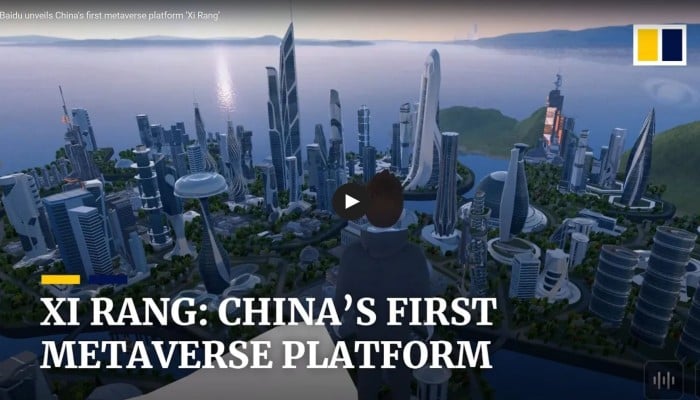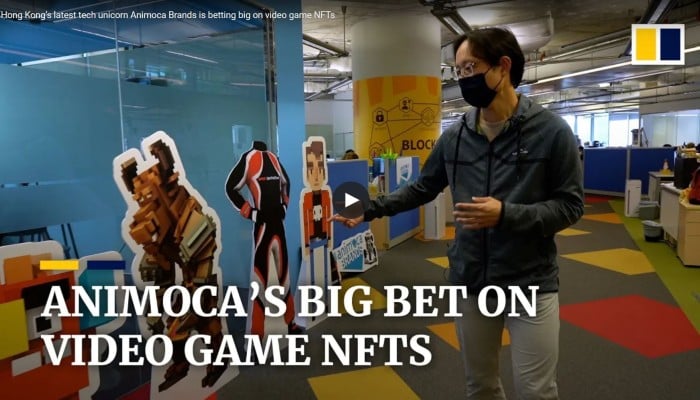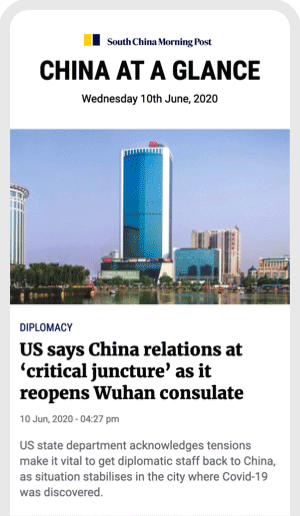Hello again, Global Impact readers:
What are NFTs? What is the metaverse? What is all the fuss about?
All fair questions. And until recently, answers from most people would have been a little vague and lacking detail. But that is all changing, especially in China where the internet is already heavily regulated and restricted, and where new developments are not always welcomed with open arms by Beijing.
This week, Matt Haldane, a production editor with the technology desk here at the SCMP, brings us up to speed on all things NFT and metaverse, and on how China is trying to walk the tightrope by embracing this bold new world while also maintaining its control over the internet.
Best,
Andrew Mullen
Production Editor, Political EconomyCan China ‘nail Jell-O to the wall’ again?
In the last week of November, the anti-money-laundering chief at China’s central bank warned at a financial forum that the metaverse and non-fungible tokens (NFTs) could become tools for illegal transactions, including blackmail and financing terrorism.
That very same week, Hong Kong’s popular metaverse platform The Sandbox sold a plot of virtual land for a record US$4.3 million to New York-based Republic Realm, illustrating that, in at least one part of China, the “borderless” online world that authorities fear is already a reality.
On the face of it, it is easy to see why NFTs, the blockchain-based technology that has introduced scarcity to digital assets, and the metaverse, a conceptual immersive virtual world considered to be the next iteration of the internet, are not the sorts of things that Beijing wants running rampant inside its walled-off internet, where it tries to enforce “cyber sovereignty”.
But at the same time, the central government has been pushing blockchain development, and local governments are developing metaverse projects, while state media offer NFTs, or what Xinhua calls “news digital collectibles”.
Thanks to the semi-autonomous status of Hong Kong, Beijing thinks it can have it both ways. Mainland China gets its own metaverse and blockchains, while Hong Kong integrates with the rest of the world. But neither technology yet has universal standards, which could mean the metaverse is splintering before it has even gotten off the ground.
For several months, Chinese state media and organisations have been sounding the alarm about these new technologies, promising a decentralised internet where users are in control.
One think tank called the metaverse a national security risk, and Communist Party mouthpiece People’s Daily has repeatedly warned that NFTs are a “huge bubble” and a “zero-sum game” that enables fraud.
Chinese tech giants, including Tencent and Alibaba, have their own NFT platforms that shun the buzzword. The preferred term in China is “digital collectables”. They are still blockchain-based tokens tied to assets such as artwork, but they cannot be bought with cryptocurrency nor resold for profit, making them poor investments.
China’s Blockchain Service Network is trying to integrate domestic networks with a Distributed Digital Certificates (BSN-DDC) platform that allows people to buy NFTs on public blockchains, like Ethereum, without directly participating on those blockchains, which would be illegal under current cryptocurrency laws. This would eliminate the risk that people would be buying and selling such assets anonymously, at least in theory.
Things could not be more different south of the border in Hong Kong, where start-ups have been piling into the NFT space, vying to become the next Bored Ape Yacht Club. Unhindered by the mainland’s ban on cryptocurrencies and other rules, NFT projects in Hong Kong are using the same infrastructure as the rest of the world.
Hong Kong’s metaverse and crypto worlds are as wild as anyone might expect after watching the market over the past year. With NFT ads cropping up around the city, local artists are both grateful for the new revenue opportunities that NFTs represent, while also sometimes irked by cryptocurrency volatility.
Hongkongers have also been hit with numerous NFT scams, losing millions of dollars in cryptocurrency to hacks and phishing attempts. The city’s cybersecurity watchdog warned that NFTs and the metaverse are among the top security threats this year.
This is precisely what officials in Beijing fear. But even as the national government increases its political grip over the southern finance hub, Hong Kong’s freewheeling crypto industry has remained just that. This has paid off handsomely for some, such as The Sandbox owner Animoca Brands, which is now valued at more than US$5 billion.
The risks and rewards of the metaverse remain more tenuous, as the nebulous use cases are even less fleshed out than NFTs, but tech companies are eager to get in on the ground floor and define it on their terms.
There was such a rush to register metaverse-related trademarks in China in recent months that the National Intellectual Property Administration started rejecting applications from the likes of video-streaming platform iQiyi and social media site Xiaohongshu to prevent trademark squatting and other issues.
TikTok owner ByteDance, search giant Baidu and game maker NetEase have also all touted their metaverse chops and nascent projects, along with a slew of start-ups. But perhaps the biggest name in this space in China is Tencent.
As the world’s largest gaming company, Tencent has been making some ambitious moves towards the metaverse. It entered talks to buy Xiaomi’s gaming smartphone and hardware maker Black Shark, and it started bundling Epic Games’ Unreal Engine with its QQ messenger, pushing the mobile app’s size past 400 megabytes.
There is clearly a lot of money flowing through the NFT and metaverse ecosystems in China, but restrictions could cut off benefits that users elsewhere enjoy.
Divergent development paths are risky, but if the mainland pulls it off with Hong Kong as a crypto gateway to China, it would be yet another way domestic internet authorities have managed to “nail Jell-O to the wall”, as former US president Bill Clinton might put it.
- South China Morning Post, SCMP -
Hello again, Global Impact readers:
What are NFTs? What is the metaverse? What is all the fuss about?
All fair questions. And until recently, answers from most people would have been a little vague and lacking detail. But that is all changing, especially in China where the internet is already heavily regulated and restricted, and where new developments are not always welcomed with open arms by Beijing.
This week, Matt Haldane, a production editor with the technology desk here at the SCMP, brings us up to speed on all things NFT and metaverse, and on how China is trying to walk the tightrope by embracing this bold new world while also maintaining its control over the internet.
Best,
Andrew Mullen
Production Editor, Political EconomyCan China ‘nail Jell-O to the wall’ again?
In the last week of November, the anti-money-laundering chief at China’s central bank warned at a financial forum that the metaverse and non-fungible tokens (NFTs) could become tools for illegal transactions, including blackmail and financing terrorism.
That very same week, Hong Kong’s popular metaverse platform The Sandbox sold a plot of virtual land for a record US$4.3 million to New York-based Republic Realm, illustrating that, in at least one part of China, the “borderless” online world that authorities fear is already a reality.
On the face of it, it is easy to see why NFTs, the blockchain-based technology that has introduced scarcity to digital assets, and the metaverse, a conceptual immersive virtual world considered to be the next iteration of the internet, are not the sorts of things that Beijing wants running rampant inside its walled-off internet, where it tries to enforce “cyber sovereignty”.
But at the same time, the central government has been pushing blockchain development, and local governments are developing metaverse projects, while state media offer NFTs, or what Xinhua calls “news digital collectibles”.
Thanks to the semi-autonomous status of Hong Kong, Beijing thinks it can have it both ways. Mainland China gets its own metaverse and blockchains, while Hong Kong integrates with the rest of the world. But neither technology yet has universal standards, which could mean the metaverse is splintering before it has even gotten off the ground.
For several months, Chinese state media and organisations have been sounding the alarm about these new technologies, promising a decentralised internet where users are in control.
One think tank called the metaverse a national security risk, and Communist Party mouthpiece People’s Daily has repeatedly warned that NFTs are a “huge bubble” and a “zero-sum game” that enables fraud.
Chinese tech giants, including Tencent and Alibaba, have their own NFT platforms that shun the buzzword. The preferred term in China is “digital collectables”. They are still blockchain-based tokens tied to assets such as artwork, but they cannot be bought with cryptocurrency nor resold for profit, making them poor investments.
China’s Blockchain Service Network is trying to integrate domestic networks with a Distributed Digital Certificates (BSN-DDC) platform that allows people to buy NFTs on public blockchains, like Ethereum, without directly participating on those blockchains, which would be illegal under current cryptocurrency laws. This would eliminate the risk that people would be buying and selling such assets anonymously, at least in theory.
Things could not be more different south of the border in Hong Kong, where start-ups have been piling into the NFT space, vying to become the next Bored Ape Yacht Club. Unhindered by the mainland’s ban on cryptocurrencies and other rules, NFT projects in Hong Kong are using the same infrastructure as the rest of the world.
Hong Kong’s metaverse and crypto worlds are as wild as anyone might expect after watching the market over the past year. With NFT ads cropping up around the city, local artists are both grateful for the new revenue opportunities that NFTs represent, while also sometimes irked by cryptocurrency volatility.
Hongkongers have also been hit with numerous NFT scams, losing millions of dollars in cryptocurrency to hacks and phishing attempts. The city’s cybersecurity watchdog warned that NFTs and the metaverse are among the top security threats this year.
This is precisely what officials in Beijing fear. But even as the national government increases its political grip over the southern finance hub, Hong Kong’s freewheeling crypto industry has remained just that. This has paid off handsomely for some, such as The Sandbox owner Animoca Brands, which is now valued at more than US$5 billion.
The risks and rewards of the metaverse remain more tenuous, as the nebulous use cases are even less fleshed out than NFTs, but tech companies are eager to get in on the ground floor and define it on their terms.
There was such a rush to register metaverse-related trademarks in China in recent months that the National Intellectual Property Administration started rejecting applications from the likes of video-streaming platform iQiyi and social media site Xiaohongshu to prevent trademark squatting and other issues.
TikTok owner ByteDance, search giant Baidu and game maker NetEase have also all touted their metaverse chops and nascent projects, along with a slew of start-ups. But perhaps the biggest name in this space in China is Tencent.
As the world’s largest gaming company, Tencent has been making some ambitious moves towards the metaverse. It entered talks to buy Xiaomi’s gaming smartphone and hardware maker Black Shark, and it started bundling Epic Games’ Unreal Engine with its QQ messenger, pushing the mobile app’s size past 400 megabytes.
There is clearly a lot of money flowing through the NFT and metaverse ecosystems in China, but restrictions could cut off benefits that users elsewhere enjoy.
Divergent development paths are risky, but if the mainland pulls it off with Hong Kong as a crypto gateway to China, it would be yet another way domestic internet authorities have managed to “nail Jell-O to the wall”, as former US president Bill Clinton might put it.
|
Was this newsletter forwarded to you? Subscribe here
|

|
|
|
|
|
19 February 2022 |
|
Welcome to our 932 newly joined SCMP Global Impact readers who signed up in the past week.
|
|
Hello again, Global Impact readers:
What are NFTs? What is the metaverse? What is all the fuss about?
All fair questions. And until recently, answers from most people would have been a little vague and lacking detail. But that is all changing, especially in China where the internet is already heavily regulated and restricted, and where new developments are not always welcomed with open arms by Beijing.
This week, Matt Haldane, a production editor with the technology desk here at the SCMP, brings us up to speed on all things NFT and metaverse, and on how China is trying to walk the tightrope by embracing this bold new world while also maintaining its control over the internet.
Best,
Andrew Mullen
Production Editor, Political Economy
Can China ‘nail Jell-O to the wall’ again?
In the last week of November, the anti-money-laundering chief at China’s central bank warned at a financial forum that the metaverse and non-fungible tokens (NFTs) could become tools for illegal transactions, including blackmail and financing terrorism.
That very same week, Hong Kong’s popular metaverse platform The Sandbox sold a plot of virtual land for a record US$4.3 million to New York-based Republic Realm, illustrating that, in at least one part of China, the “borderless” online world that authorities fear is already a reality.
On the face of it, it is easy to see why NFTs, the blockchain-based technology that has introduced scarcity to digital assets, and the metaverse, a conceptual immersive virtual world considered to be the next iteration of the internet, are not the sorts of things that Beijing wants running rampant inside its walled-off internet, where it tries to enforce “cyber sovereignty”.
But at the same time, the central government has been pushing blockchain development, and local governments are developing metaverse projects, while state media offer NFTs, or what Xinhua calls “news digital collectibles”.
Thanks to the semi-autonomous status of Hong Kong, Beijing thinks it can have it both ways. Mainland China gets its own metaverse and blockchains, while Hong Kong integrates with the rest of the world. But neither technology yet has universal standards, which could mean the metaverse is splintering before it has even gotten off the ground.
For several months, Chinese state media and organisations have been sounding the alarm about these new technologies, promising a decentralised internet where users are in control.
One think tank called the metaverse a national security risk, and Communist Party mouthpiece People’s Daily has repeatedly warned that NFTs are a “huge bubble” and a “zero-sum game” that enables fraud.
Chinese tech giants, including Tencent and Alibaba, have their own NFT platforms that shun the buzzword. The preferred term in China is “digital collectables”. They are still blockchain-based tokens tied to assets such as artwork, but they cannot be bought with cryptocurrency nor resold for profit, making them poor investments.
China’s Blockchain Service Network is trying to integrate domestic networks with a Distributed Digital Certificates (BSN-DDC) platform that allows people to buy NFTs on public blockchains, like Ethereum, without directly participating on those blockchains, which would be illegal under current cryptocurrency laws. This would eliminate the risk that people would be buying and selling such assets anonymously, at least in theory.
Things could not be more different south of the border in Hong Kong, where start-ups have been piling into the NFT space, vying to become the next Bored Ape Yacht Club. Unhindered by the mainland’s ban on cryptocurrencies and other rules, NFT projects in Hong Kong are using the same infrastructure as the rest of the world.
Hong Kong’s metaverse and crypto worlds are as wild as anyone might expect after watching the market over the past year. With NFT ads cropping up around the city, local artists are both grateful for the new revenue opportunities that NFTs represent, while also sometimes irked by cryptocurrency volatility.
Hongkongers have also been hit with numerous NFT scams, losing millions of dollars in cryptocurrency to hacks and phishing attempts. The city’s cybersecurity watchdog warned that NFTs and the metaverse are among the top security threats this year.
This is precisely what officials in Beijing fear. But even as the national government increases its political grip over the southern finance hub, Hong Kong’s freewheeling crypto industry has remained just that. This has paid off handsomely for some, such as The Sandbox owner Animoca Brands, which is now valued at more than US$5 billion.
The risks and rewards of the metaverse remain more tenuous, as the nebulous use cases are even less fleshed out than NFTs, but tech companies are eager to get in on the ground floor and define it on their terms.
There was such a rush to register metaverse-related trademarks in China in recent months that the National Intellectual Property Administration started rejecting applications from the likes of video-streaming platform iQiyi and social media site Xiaohongshu to prevent trademark squatting and other issues.
TikTok owner ByteDance, search giant Baidu and game maker NetEase have also all touted their metaverse chops and nascent projects, along with a slew of start-ups. But perhaps the biggest name in this space in China is Tencent.
As the world’s largest gaming company, Tencent has been making some ambitious moves towards the metaverse. It entered talks to buy Xiaomi’s gaming smartphone and hardware maker Black Shark, and it started bundling Epic Games’ Unreal Engine with its QQ messenger, pushing the mobile app’s size past 400 megabytes.
There is clearly a lot of money flowing through the NFT and metaverse ecosystems in China, but restrictions could cut off benefits that users elsewhere enjoy.
Divergent development paths are risky, but if the mainland pulls it off with Hong Kong as a crypto gateway to China, it would be yet another way domestic internet authorities have managed to “nail Jell-O to the wall”, as former US president Bill Clinton might put it.
|
|
|
|
|
|

|
|
China’s Metaverse gold rush is on as investors pile in
|
| • |
Big Tech is getting in on the Metaverse scene alongside a host of start-ups. although questions remain over how these virtual worlds should develop | | | • | Concept gained traction during pandemic as people confined to their homes took to games like Fortnite and Roblox to socialise and create new worlds
|
|
|
In April with virtually no prior programming experience, Richard O’Connell, based in China’s tech hub Shenzhen, was amazed to learn that the first game he created for Roblox made him about US$5,000 a month, after just a short time learning. It was then that the UK expat knew it was time for him to leave his job at the US game-making platform and start a company dedicated to the “Metaverse” – a shared 3D virtual space linked to a perceived virtual universe and seen by many as the future of the internet. Read more
|
|
|
|

|
|
‘Ready Player One’ wasn’t wrong – a whole digital world awaits us
|
| • |
The metaverse is a digital place where you go to find the things you love in a single, seamless experience – and when you leave, the world continues to develop | | | • | This vision is starting to become a reality, even if obstacles such as licensing rights stand in the way of progress towards a fully immersive virtual world
|
|
|
Welcome to the pleasuredome! The digital world is fast becoming a reality to rival the physical world, and media are converging to form a “metaverse” that allows humans to assume a single digital identity and seamlessly move around in an infinite space that’s filled with their favourite games, films and music. That was the big takeaway from the recent LA Games Conference, which this year took place online, organised by Digital Media Wire. In panels, speakers debated the impact of converging media on the future of humanity, as well as analysing new trends, the impact of NFTs on their business and the state of companies’ bottom lines. Read more
|
|

|
|
|

|
|
Tencent says it has the tech needed for metaverse, and Beijing won’t object
|
| • |
The company can approach the metaverse through its video game and social networking businesses, according to Tencent president Martin Lau | | | • | The last time a Tencent executive publicly spoke about the metaverse was at the company’s annual video gaming conference in May
|
|
|
Tencent Holdings, the world’s biggest gaming company and operator of Chinese super app WeChat, officially broke its silence on the red-hot concept of the metaverse, saying it has an abundance of technologies to develop what has been called the next iteration of the internet. Martin Lau, president of the Shenzhen-based company, said on an earnings call on Wednesday that it can potentially approach the metaverse through a range of businesses, citing video game development and social networking as major strengths. The 48-year-old executive also said Beijing does not appear to be “fundamentally averse” to the metaverse, although it would come up with a set of regulations different from the rest of the world. Read more
|
|

|
|
Can cartoon apes land these NFT owners a fortune?
|
| • |
Hong Kong buyers of Bored Apes non-fungible tokens see their investments explode in value in the span of months | | | • | But rather than cash in by selling, some owners think their NFTs could grow into something bigger
|
|
|
When 27-year-old Raye Chung from Hong Kong bought herself a non-fungible token (NFT) from the Bored Ape Yacht Club (BAYC) project in July, she had little inkling that this portrait of a cartoon ape would become one of the world’s most sought-after digital collectibles. Four months later, Chung saw the price of that image, which she bought for under US$10,000, rise to more than US$200,000. With only 10,000 portraits of similar cartoon apes in circulation, Chung has joined an exclusive group of BAYC members that include global celebrities such as US talk show host Jimmy Fallon and American basketball star Stephen Curry. Read more
|
|

|
|
|
_20220218155319.jpg)
|

|
|
China to create own NFT industry based on state-backed blockchain network
|
| • |
The BSN-Distributed Digital Certificate does not support crypto-transacted NFTs, and will allow businesses and individuals to build apps and portals to manage tokens | | | • | The new infrastructure has the potential to disrupt the current industry, having already attracted more than 20 partners
|
|
|
China’s state-backed Blockchain Services Network (BSN) plans to roll out infrastructure at the end of this month to support the deployment of non-fungible tokens (NFTs), a major step to creating a Chinese NFT industry that is not linked to cryptocurrencies. Although Beijing has banned cryptocurrencies, He Yifan, chief executive of Red Date Technology, which provides technical support to BSN, told the South China Morning Post that NFTs “have no legal issue in China” as long as they distance themselves from cryptocurrencies like bitcoin. Read more
|
|

|
|
Chinese bitcoin miner exodus faces hurdles as equipment remains stuck from shipment delays, tariffs and legal quagmire
|
| • |
As many as 2 million cryptocurrency mining machines are stuck in China’s Sichuan province, lawyers estimate, after a government crackdown halted operations | | | • | Miners trying to move to North America are losing millions of dollars while waiting to export machines through complex shipping routes to avoid tariffs
|
|
|
A massive exodus of bitcoin mining equipment from China is facing hurdles as millions of machines remain stuck over complex relocation procedures, according to lawyers handling such cases. The country’s cryptocurrency mining industry continues to deal with delays in getting their operations up and running again since the government started clamping down on related activities last May. The bitcoin mining crackdown has already pushed much of this activity offshore, but large mining operations are finding it difficult to get their pricey, specialised hardware out of the country. Read more
|
|
|
To keep track of the latest global news developments, follow our daily coverage on our website or focus on stories about NFTs and the metaverse.
In our next issue, our economy desk will look at the latest on China trade, including the RCEP and CPTPP trade deals and the outlook for the relationship with the United States after the phase-one trade deal expired at the end of last year.
We welcome your feedback. Email me at globalimpact@scmp.com or tweet me at @mdhaldane. Plus, be sure to check out our tech feed for the latest news and analysis.
Thank you, and with regards,
Matt Haldane
|

|
|
Matt Haldane
Production editor, Technology
|
|
|
|
|
|
| SCMP NEWSLETTERS THAT MAY INTEREST YOU |

China at a Glance
A wealth of insights giving you the inside story on China every day.
China Economic Update
The latest developments from trade relations to growth rates and other key economic data.
Inside China Tech
Our weekend newsletter covering the biggest stories and updates from the tech centres of China.
VIEW AND SIGN UP
|

|
|
|
Download our app
To get push notifications direct and never miss a story as it breaks
|
|
|
|
|
Hong Kong
China
Asia
World
Economy
Business
Tech
Comment
|
|
|
|
This email was sent to [email]
unsubscribe from this list
update subscription preferences
South China Morning Post Publishers Ltd · 19/F Tower 1 · 1 Matheson Street · Hong Kong · Hong Kong
Copyright © 2022 South China Morning Post Publishers Ltd. All rights reserved.
|






_20220218155319.jpg)








_20220218155319.jpg)

